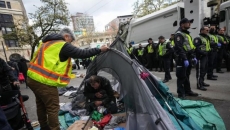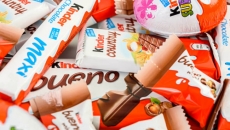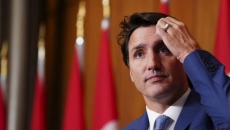VICTORIA - Prime Minister Justin Trudeau says he wants to make it easier for more Canadians to drive electric vehicles and he isn't ruling out nuclear power as a cleaner source of energy.
Trudeau said electric vehicles fight pollution, but often are too expensive for many Canadians.
"We know we need to cut emissions," he said Monday at an outdoor news conference at Royal Roads University in the suburban Victoria community of Colwood.
"We know we need to reduce pollution and one of the best ways of doing that is to get more clean cars on the road," he said.
One of the best ways to cut pollution is to get more clean cars on the road. That’s why, with #Budget2022, we’re making electric vehicles easier to buy – and easier to charge. Tune in now for the details: https://t.co/JV66Ncx9Np
— Justin Trudeau (@JustinTrudeau) April 11, 2022
Last week's federal budget placed an emphasis on transitioning to the green economy, which included expanding the availability of zero-emission vehicles and charging stations, Trudeau said.
The federal government will extend a current program that offers electric vehicle buyers up to $5,000 to help with purchases and it will introduce mandatory sales targets that require 20 per cent of all vehicles sold by 2026 to be electric, he said.
"We know electric vehicles are more expensive up front even if over the long term they turn out to be cheaper," said Trudeau. "We know people need that help up front."
The sales target program will expand over the coming years, said Trudeau, with 60 per cent of vehicle sales being electric by 2030 and 100 per cent by 2035.
The 2022 budget includes $400 million over five years to expand charging infrastructure.
"The investment in this budget is going to allow for thousands more (charging stations)," Trudeau said. "We know that that is a key path forward in helping families make that final decision to switch to electric."
In order to charge those vehicles, Trudeau said Canada must embark on more electrification initiatives, including the possibility of increased nuclear power.
“It’s very clear, first of all, that we need to reduce our emissions, we need to reduce our dependence on oil and gas," he said. "If we didn’t already know that, the conflict in Ukraine right now with Russia’s illegal invasion is emphasizing just how much we need to be able to find cleaner sources of energy for our communities, for our country."
Trudeau did not expand on the possible expansion of nuclear power in Canada, saying, “Nuclear’s on the table, absolutely.”
A spokeswoman for a Canadian clean energy think tank said five per cent of Canada's vehicle sales are already electric models, with B.C. at 13 per cent.
Merran Smith, Clean Energy Canada executive director, said recent data suggests 80 per cent of Canadians are open to considering an electric vehicle.
"Despite the high sticker price of an EV, the fuel and maintenance savings are so significant that the EV version often comes out tens of thousands of dollars cheaper," she said at the news conference. "That's the future."
Three senior cabinet minister were also in B.C. and Yukon on Monday to discuss the budget.
International Development Minister Harjit Sajjan was scheduled to be in Kelowna, B.C., for a clean economy announcement and Natural Resources Minister Jonathan Wilkinson was slated to travel to Whitehorse to announce a clean energy partnership with Yukon and the Indigenous-run Tlingit Homeland Energy Limited Partnership.
Federal Fisheries Minister Joyce Murray was scheduled to be in Richmond, B.C., for an infrastructure announcement.
Trudeau's tour also included meetings scheduled with Victoria Mayor Lisa Helps and the City of Victoria Youth Advisory Council.






